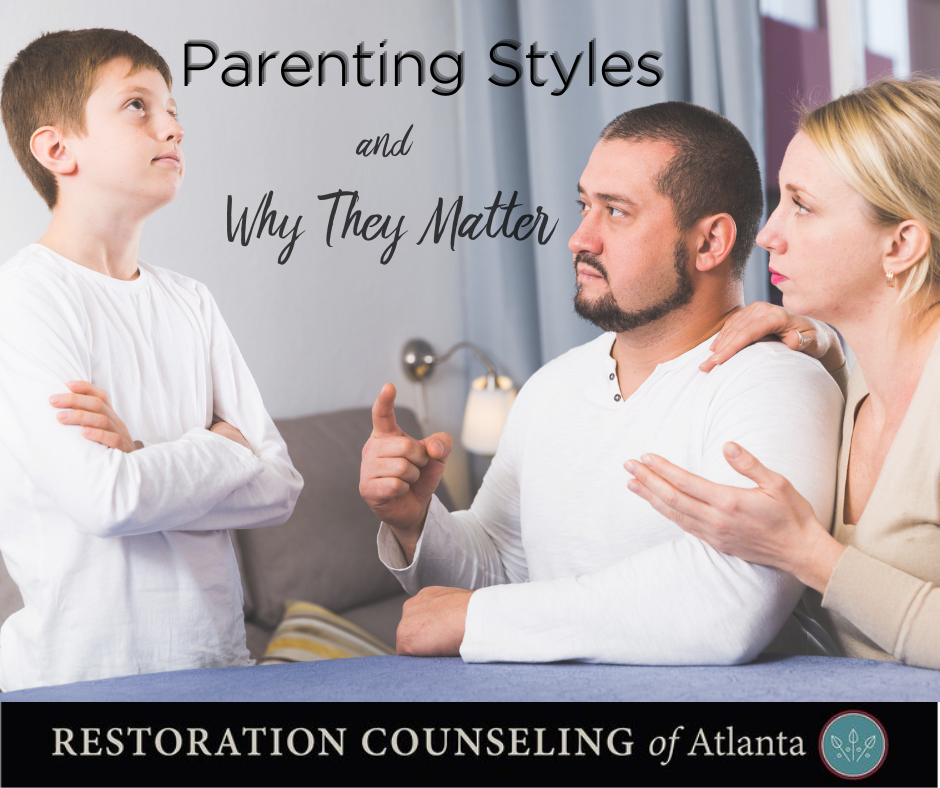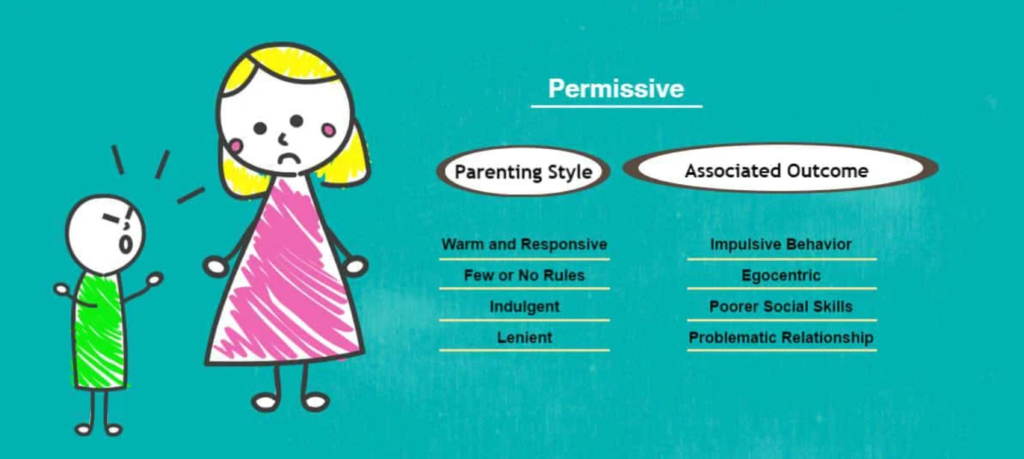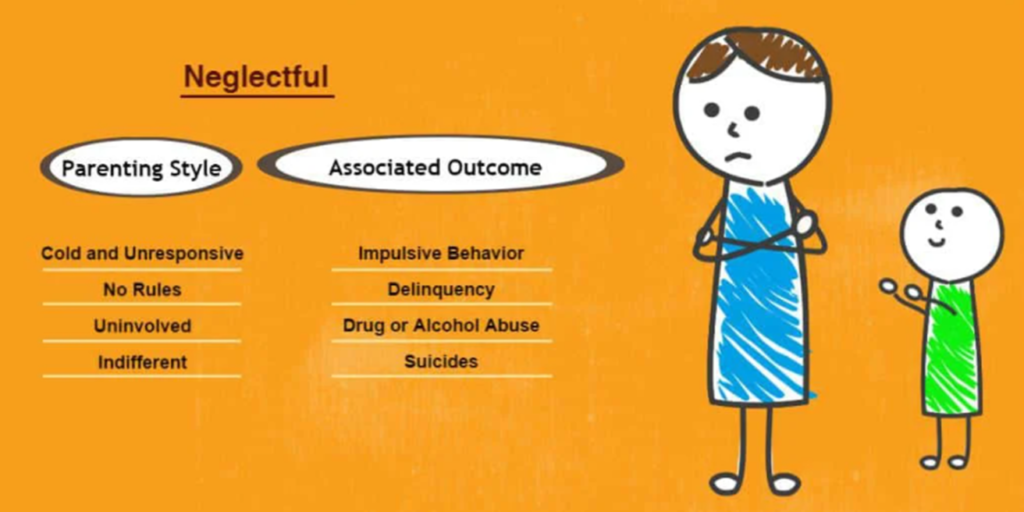There probably will not be much argument when I say that parenting can be challenging- full of joys and fun at times, for sure, but at least some of the time, challenging. Understanding parenting styles can help. Throughout time, parents have wrestled with how to raise prepared, responsible, kind, confident citizens of the world, including the usual questions like, “What’s an appropriate consequence?” and “Is this normal behavior or something I should be concerned about?” Add to these the stresses of social media, cell phones that are more powerful than some computers, and a generally more globally connected and technical world. The pressures and questions for parents and kids alike have only multiplied.
We’re all living in a more perplexing and anxious world, but parenting doesn’t have to be confusing if you understand your natural tendencies in parenting, know what you want for your kids, and focus on your goals and values. Parenting styles can help parents understand where your skills and instincts naturally fall, understand the strengths and risks of these, and identify points where you’d like to make changes.
What are Parenting Styles?
Researchers have long wondered about the influence of parenting on child development. Why is it that some children raised in dramatically different environments can later grow up to have remarkably similar personalities while children who share a home and are raised in the same environment can grow up to have very different personalities? Studies can provide only correlational information, not definitive cause-and-effect relationships. This is likely because they are studying unique individuals in unique relationships with each other. Yet, despite not knowing the exact impact of parenting on development, it is undeniable that long-term health and happiness start in childhood. A child’s parental interactions are a foundational aspect of their well-being, starting very early on in their lives.
The origins of today’s commonly accepted parenting styles come from the 1960s when psychologist Diana Baumrind conducted a survey of more than 100 pre-school aged children and their parents and identified some important dimensions of parenting. These dimensions include disciplinary strategies, warmth and nurturing, communication styles, and expectations of maturity and control. Based on these dimensions, Baumrind suggested that most parents display one of three different parenting styles. Later research by Maccoby and Martin suggested adding a fourth parenting style. Each of these has different effects on children’s behavior. (Cherry, 2020)
Authoritarian Parenting
In this style of parenting, parents take rules seriously and expect obedience. Children are supposed to follow the parents’ strict rules, and failure to follow such rules usually results in punishment. Authoritarian parents don’t explain the reasoning behind these rules, and if asked to explain, might simply reply, “Because I said so.”
While these parents have high demands, they are not very responsive to their children. They expect their children to behave exceptionally and not make errors, yet they provide very little direction about what their children should do or avoid in the future. Mistakes are punished, often quite harshly, yet their children are often left wondering exactly what they did wrong. Authoritarian parents are not particularly warm and bristle at excuses and questions.
Baumrind says these parents “are obedience- and status-oriented, and expect their orders to be obeyed without explanation.” They are often described as domineering and dictatorial. Their approach is “spare the rod, spoil the child” (Cherry, 2020).
Authoritarian parenting styles generally lead to obedient and capable children, but they rank lower in happiness, social competence, and self-esteem. It can lead to a failure to bond emotionally, meaning little authentic relationship between parents and adult children, as well as rebellious behavior, anxiety, and delinquency through the developmental years.
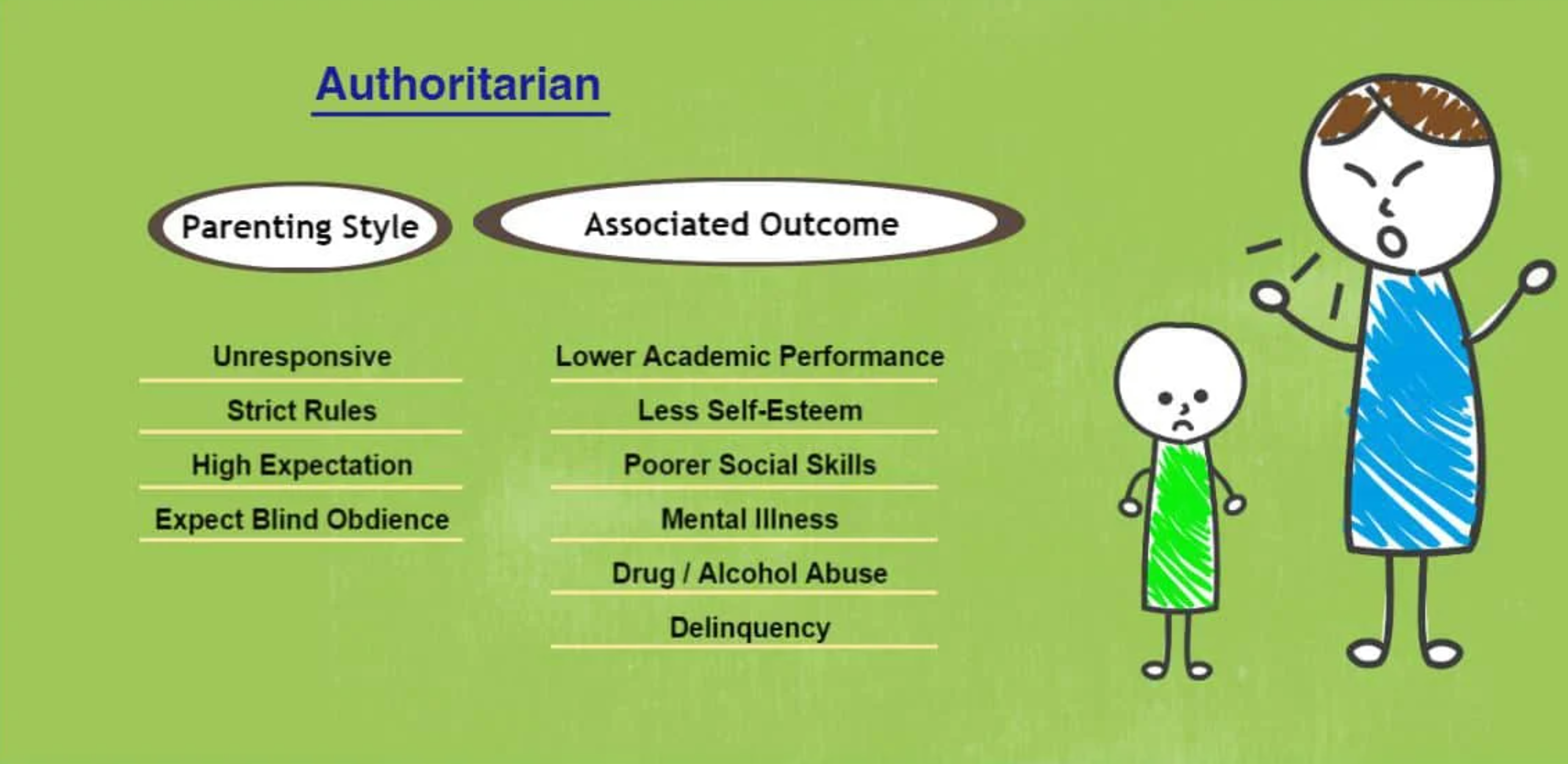 Image from Parentingforbrain.com
Image from Parentingforbrain.com
Authoritative Parenting
Like authoritarian parents, those with an authoritative parenting style establish rules and guidelines that their children are expected to follow. However, this parenting style is much more democratic. Authoritative parents are parents, not friends, but they’re not shy about praising kids. They’re firm but warm, holding high expectations but prepared to reward kids when they’re met.
Authoritative parents are responsive to their children and willing to listen to questions. These parents expect a lot from their children, but they provide warmth, feedback, and adequate support. When children fail to meet the expectations, these parents are more nurturing and forgiving rather than punishing, often coaching children on their mistakes to learn and grow.
Baumrind says these parents “monitor and impart clear standards for their children’s conduct. They are assertive, but not intrusive and restrictive. Their disciplinary methods are supportive, rather than punitive. They want their children to be assertive as well as socially responsible, and self-regulated as well as cooperative” (Cherry, 2020).
The combination of expectation and support helps children of authoritative parents develop skills such as independence, self-control, and self-regulation and tends to result in children who are happy, capable, and successful. Authoritative parenting usually leads to positive, respectful parent-child relationships that last into the adult years.
 Image from Parentingforbrain.com
Image from Parentingforbrain.com
Permissive Parenting
Permissive parents, sometimes referred to as indulgent parents, make very few demands of their children. These parents rarely discipline their children because they have relatively low expectations of maturity and self-control. Permissive parents are enablers, but it comes from a place of genuine love. They want their kids to enjoy their childhood, so they’re less likely to enforce rules and more likely to provide toys and let bad behavior slide.
According to Baumrind, permissive parents “are more responsive than they are demanding. They are nontraditional and lenient, do not require mature behavior, allow considerable self-regulation, and avoid confrontation” (Cherry, 2020). Permissive parents are generally nurturing and communicative with their children, often taking on the status of a friend more than that of a parent.
Permissive parenting often results in children who rank low in happiness and self-regulation. These children are more likely to experience problems with authority and tend to perform poorly in school. It can lead to a cordial parent-child relationship, but may also result in impulsive or materialistic behavior as kids get older.
Image from Parentingforbrain.com
Uninvolved (Neglectful) Parenting
In addition to the three major styles introduced by Baumrind, psychologists Eleanor Maccoby and John Martin proposed a fourth style: uninvolved or neglectful parenting. An uninvolved parenting style is characterized by few demands, low responsiveness, and very little communication.
While these parents fulfill the child’s basic needs, they are generally detached from their child’s life, possibly making sure their kids are fed and have shelter, but offering little in the way of guidance, structure, rules, or support. Uninvolved parents are not present physically, emotionally, or both, and they don’t feel emotionally connected to their child’s well-being. They may be actively abusive to their child or overlooking abuse in their surroundings.
Uninvolved parenting styles rank lowest in child outcomes across all domains. These children tend to lack self-control, have low self-esteem, and are less competent than their peers.
Image from Parentingforbrain.com
Other Influences on Child Outcomes
It is essential to note that other factors including culture, children’s temperament, children’s perceptions of parental treatment, and social influences also play an important role in children’s behavior. Even our perceptions about the surrounding world shape how we parent our children (Sorrenti, 2019). Also, some studies found that the authoritative style isn’t always linked to the best school achievement across families from diverse ethnic (e.g., Asian, Black, Hispanic) and socioeconomic backgrounds (e.g., income level, parental education, number of active parents) (parentingforbrain.com, 2021).
For over 25 years, the authoritative style has been the most consistently linked to positive outcomes for children; however, all kids are different, and different kids need different parenting styles. Sometimes, the same kid may need a different parenting style in different situations!
Keep in mind that each child is a unique individual, as is each parent, so there are many dynamics at play in how parents can or cannot influence their children.
For instance, there is some evidence that a child’s behavior can impact parenting styles. According to Cherry (2020), one study published in 2006 found that the parents of children who exhibited difficult behavior began to exhibit less parental control over time. These results suggest that kids might misbehave not because their parents were too permissive, but because the parents of difficult or aggressive children gave up on trying to control their kids.
The parenting styles of individual parents also combine to create a unique blend in each family. For example, the mother may display an authoritative style while the father favors a more permissive approach. This can sometimes lead to mixed signals. To create a cohesive approach to parenting, parents must learn to cooperate and combine their unique parenting styles.
Final Thoughts
Few of us fit neatly into one single parenting style, but rather raise children using a combination of styles. Think of the four styles as a continuum instead of four distinct ways to parent. Ideally, we think about our children and what they need from us at specific points in time.
As a parent, if I have to choose one parenting style without any research data, I will consider my parenting goals and the type of parent I want to be. My ultimate parenting goal is to raise healthy, happy, kind, and responsible people who will love our family and me when they grow up. AND I also want to enjoy the experience of parenting as much as I can.
It is hard to imagine that being cold and strict (authoritarian), cold and indifferent (neglectful), or warm and indulgent (permissive) will achieve all of my goals. Therefore, an authoritative parenting style makes sense to me most of the time. I have been known to revert to being authoritarian when necessary and permissive when possible to fit the needs of my kids and myself—I’ve probably been indifferent (though not neglectful or abusive!) at moments because I am human, have limits, and make mistakes, too! So thinking of parenting styles on a continuum makes sense.
The bottom line is to know how you tend to respond and evaluate if that style fits what you need, what your child needs (evaluate that for each child independently), what your family needs, and whether it aligns with your goals and values for yourself and your children. If you don’t like the way you’re doing things or the way your child is responding, you may need to make some adjustments.
As I said in the very beginning, this parenting thing is HARD! But so very worth it when you see them blossom into who God intended them to be. Here’s a great graphic from the Connected Families website (Jackson, 2002) that can shape your parenting goals to lay a strong foundation for your kids to fully develop their potential in life and in their lifelong relationships with you.
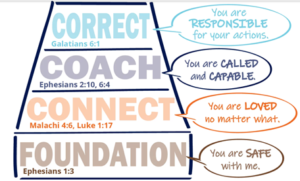
 by Paige Santmyer, MA NCC APC
by Paige Santmyer, MA NCC APC
Roswell location
paige@restorationcounselingatl.com,ext. 157
Paige provides a safe and comfortable atmosphere where clients can explore the challenges they are facing. She also believes in addressing the individual’s entire personhood, assessing needs in all domains of life instead of focusing solely on mental health needs. Paige works with adults and teens around depression, anxiety, mood disorders, relationship issues, trauma, PTSD, and life transitions.
References
Bright Horizons Education Team. (January 6, 2020). What is my parenting style? Four types of parenting. Retrieved from: https://www.brighthorizons.com/family-resources/parenting-style-four-types-of-parenting
Cherry, K. (April 14, 2020). Why parenting styles matter when raising children. Retrieved from: https://www.verywellmind.com/parenting-styles-2795072
Jackson, J. & L. (2002). Connected families: Our framework. Retrieved from: https://connectedfamilies.org/about/our-framework/
Morin, A. (July 12, 2019). 4 Types of parenting styles and their effects on kids: What’s your parenting style? Retrieved from: https://www.verywellfamily.com/types-of-parenting-styles-1095045
Neve. (Jul 31, 2019). American SPCC. 14 Parenting styles demystified. Retrieved from: https://americanspcc.org/14-parenting-styles-demystified/?gclid=CjwKCAiAuoqABhAsEiwAdSkVVJu-On-yTNgB5Kzb2QFJgjElLPzub5k5MevPfQiGqqgEAv15Sb2r_BoCEoMQAvD_BwE
Parentingforbrain.com. (Jan 25, 2021). 4 Types of parenting styles and their effects. Retrieved from: https://www.parentingforbrain.com/4-baumrind-parenting-styles/
Sorrenti, G. (March 6, 2019). What kind of parent are you? Parenting styles are heavily influenced by the socioeconomic environment. Retrieved from: https://bold.expert/what-kind-of-parent-are-you/?gclid=CjwKCAiAuoqABhAsEiwAdSkVVG3ruHieUurXweC9R3b1aa2hBhHOTkxxAHBwupVBQtzRNiTSMmYSmhoCglgQAvD_BwE

